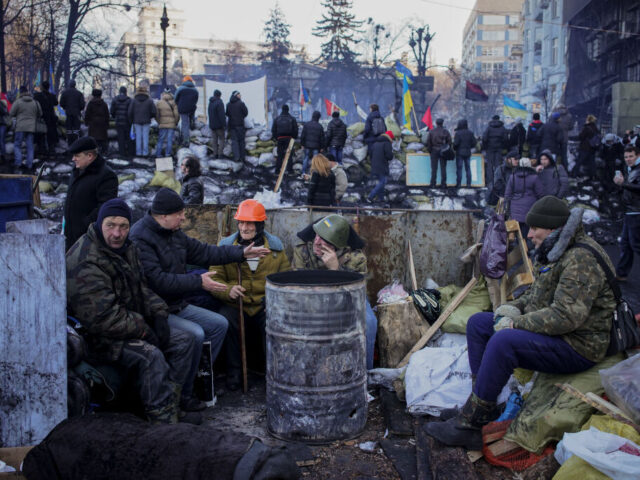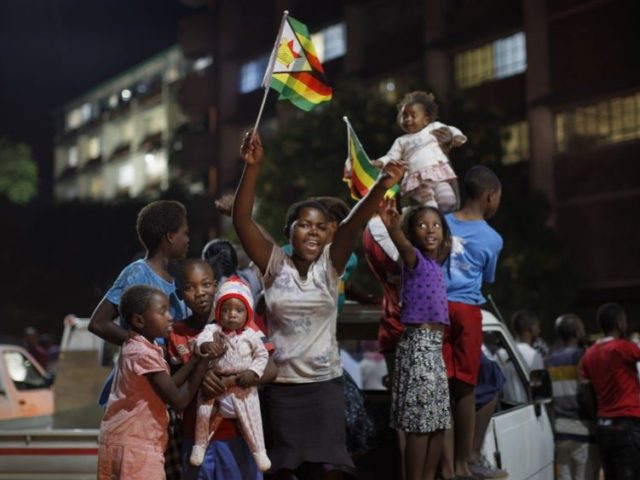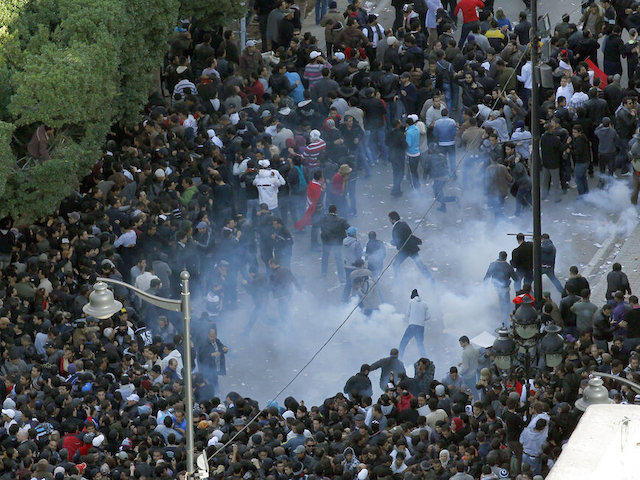
The Fourth of July is a celebration of the most successful revolution in the history of mankind. By any objective measure, the rebellious colonies that broke away from the British empire in 1776 were more successful in forming an enduring new nation than other rebels and separatists throughout history.
Indeed, the United States of America was soon put to its own rebellion test and the Union endured, surviving one of the most devastating wars ever fought.
The history of rebellions in the modern age has not been terribly encouraging. Rising up against despotic rulers seems to be harder than ever in the Information Age, as authoritarian regimes became highly adept at using the Internet to keep their populations subdued and fearful. Nascent uprisings are sniffed out with astounding speed, and put down with brutal efficiency.
The attention of the world is presently consumed by a war waged against one of the few successful revolutions of the new century: Ukraine.
There were actually two revolutionary movements in Ukraine, the Orange Revolution of 2004 and the Euromaidan uprising of 2014. The Orange Revolution was a massive popular protest that erupted after pro-Russian leader Victor Yanukovych was accused of stealing the 2004 election with vote fraud.

Protesters sit at the barricades during the uprising against Viktor Yanukovych in Kyiv, Ukraine, in 2014. (Photo by Giles Clarke/Getty Images)
Yanukovych was kept out of power by those protests, but he made a comeback in 2010, developed a reputation as one of the most fabulously corrupt rulers in the modern world, and was forced out of power for good by the Euromaidan demonstrations of 2014. Yanukovych fled Kyiv in a helicopter and has lived in exile in Russia ever since. A Ukrainian court found him guilty of treason in 2019 for using excessive violence in a failed effort to crush the Euromaidan protests, and in 2021 Ukraine designated Yanukovych and several of his cronies for punitive sanctions.
Ukraine has, until now, remained free of Russian control, but it also faces its own revolutionary separatist movement, the Donbas rebellion.
Donbas is the region of eastern Ukraine that borders Russia and many ethnic Russians live there. After the Euromaidan revolution deposed Moscow’s man Yanukovych, Russian President Vladimir Putin began supporting self-appointed separatist governments in the Donbas provinces of Donetsk and Luhansk. The separatists fought an ugly stalemated war against the Ukrainian government from 2014 to 2022, with Russian military formations periodically massing across the border as Putin threatened to intervene.
When Putin finally did invade Ukraine in February 2022, he formally recognized the “People’s Republics of Donetsk and Luhansk,” unilaterally declaring two new “independent” states which are acknowledged by no other government on Earth.
The success of the Donbas revolution will probably remain undecided until the Russia-Ukraine war is settled, but few observers believe Putin would agree to any peace treaty that did not acknowledge the “independence” of Donetsk and Luhansk, under heavy Russian “protection.” The success of the Euromaidan revolution may likewise be determined by how the Russian invasion ends.

Zimbabweans celebrate at night at an intersection in downtown Harare, Zimbabwe Tuesday, Nov. 21, 2017. Mugabe “resigned” as president with immediate effect Tuesday after 37 years in power, shortly after parliament began impeachment proceedings against him. (AP Photo/Ben Curtis)
Another successful revolution occurred in Zimbabwe, where dictator Robert Mugabe was ousted in November 2017 after 37 years of brutal kleptocratic rule. Mugabe was 93 years old when he stepped down, making him the world’s oldest national leader. He died two years later in September 2019.
Mugabe was technically deposed in a coup, as the military placed him under house arrest before his Zanu-PF party convinced him to resign, but Zimbabwe was not ruled by the military. Power was transferred to Emmerson Dambudzo “The Crocodile” Mnangagwa, Mugabe’s final vice president and longtime hatchet man, whose sacking by the aging dictator was the event that precipitated the soft coup.
Mnangagwa went on to win a full term as president in 2018, in an election challenged as corrupt by opposition leaders, and he will stand for re-election in August 2023. His leading opponent is Nelson Chamisa, the same opposition leader who accused Mnangagwa of stealing the 2018 election. Zimbabwe is far from perfect, but at least it is still holding some form of elections after four decades of one-man despotic rule.
The great revolutionary movement of the “Arab Spring” in 2011 produced few actual revolutions. Only Tunisia made a permanent change to its system of government – and it might be on the verge of sliding back into despotism.
Tunisia’s dictator of 23 years, Zine el Abidine Ben Ali, fled the country with surprisingly little fanfare in January 2011 after a month of furious protests were touched off by a desperate street vendor setting himself on fire. Ben Ali lived the rest of his life in exile in Saudi Arabia, dying there in 2019. Tunisia became a not-terribly-successful multiparty democracy after Ben Ali’s departure, until the election of President Kais Saied in 2019.

FILE – In this file photo dated Friday, Jan. 14, 2011, demonstrators scatter after police officers use teargas during a protest in Tunis. Tunisia’s official news agency says President Zine El Abidine Ben Ali has declared a state of emergency as riots escalated in his North African nation. On Thursday Jan. 14, 2021, Tunisia commemorates 10 years since the flight into exile of its iron-fisted leader, Zine El Abidine Ben Ali, pushed from power in a popular revolt that foreshadowed the so-called Arab Spring. (AP Photo/Christophe Ena, FILE)
Saied’s increasingly authoritarian rule broke the spirit of Tunisian democracy, with only 11 percent of voters bothering to cast ballots in the January parliamentary election – a world-record low that came to be known as the “ghost election.”
Saied has taken to arresting his political opponents, which is why top opposition parties and civil rights groups boycotted the dismal January 2023 parliamentary contest, on the theory that all other votes will be a farce until Saied is gone. A presidential election is scheduled for 2024, assuming Saied is not forced out before then – or decides that his rule will no longer be subject to elections at all.
Longtime Egyptian strongman Hosni Mubarak was ousted in February 2011 after a month of massive protests, only to be replaced by the authoritarian Islamists of the Muslim Brotherhood, who were in turn ousted by a coup in 2013. Coup leader Abdel Fattah el-Sisi remains in power to this day, having won a couple of dubious intermediate elections with about 97 percent of the vote by effectively running unopposed.
Libya found itself without a dictator after Moammar Qaddafi was driven from power in August 2011 by a NATO-backed uprising and U.S. invasion. Qaddafi was brutally killed by his former subjects soon after he was deposed, and Libya has been a savage, endless disaster ever since, ruled by a mixture of competing governments, warlords, and terrorist gangs.
After years of false starts, heartbreaks, and one outright civil war, the United Nations is once again talking about holding national elections for Libya by the end of 2023.

Seif al-Islam, left, the son and one-time heir apparent of late Libyan dictator Moammar Gadhafi registers his candidacy for the country’s presidential elections next month, in Sabha, Libya, Sunday, Nov. 14, 2021. Al-Islam, who was seen as the reformist face of Gadhafi’s regime before the 2011 uprising, was released in June 2017 after more than five years of detention. The Libyan government ulimately disqualified the younger Gadhafi and ultimately canceled the election(Libyan High National Elections Commission via AP)
Sadly, just about every other revolution of the past two decades was a coup that delivered power to a military junta. A few of those military dictatorships have recently subjected themselves to elections, but most are holding power with an iron grip, and scarcely pretend to be “interim” governments.
Thailand has been ruled by a junta that seized power in 2014, led by military chief Prayuth Chan-ocha. The junta agreed to hold elections in May 2023 and was walloped about as hard as it could have been. To the surprise of many observers, the election appears to have broken the power of the military dictatorships and replaced Prayuth with Harvard-educated reformer Pita Limjaroenrat.
Pita still has some parliamentary hurdles to clear before taking office, and some observers wonder if the military will actually let him take power – the coup that installed Prayuth as Prime Minister in 2014 was Thailand’s 12th since World War II – but if he does, Thailand will complete a soft revolution against military dictatorship.
Hopeful signs are also emanating from Guinea, where elected President Alpha Conde was overthrown by a coup in September 2021, to be replaced by “interim” military leader Col. Mamady Doumbouya.
Doumbouya said overthrowing the 83-year-old Conde was necessary because his government was plagued by corruption and mismanagement. He also claimed Conde’s re-election in 2020 was illegitimate because Conde changed the constitution to allow himself to run for a third term.
Doumbouya allowed a “transitional assembly” to hold meetings and begin drafting a constitution in early 2022. He took a step back from democratic reforms by ordering a violent crackdown on pro-democracy protesters in May 2023, but claims he will allow elections to be held in 2025.
Mali, Myanmar, Sudan, Burkina Faso, and Chad are ruled by juntas that overthrew either dictatorships or elected governments over the past few years. Burkina Faso actually had a coup against a coup in October, as one military strongman deposed another. Sudan has been gripped by a savage battle between two military leaders for control of the junta government, with intense fighting raging even after unilateral cease-fires were declared for the Muslim holiday of Eid al-Adha.

This video grab taken from a video broadcasted on October 2, 2022 by the national television of Burkina Faso shows sub-lieutenant Jean-Baptiste Kabre (C), reading a statement surrounded by members of the military claiming to have taken power on September 30, 2022 in Ouagadougou. (Radiodiffusion Télévision du Bur/AFP via Getty Images)
In sum, the history of revolutions in the 21st Century has not been a happy one. Often the problem is that revolutionary forces merely create anarchy that can be exploited by a new dictatorship. Few societies struggling to escape from despotism have been able to develop the civil and philosophical infrastructure that made the American Revolution so successful, and few have enjoyed the geographical advantages that helped the newborn United States grow so quickly. Separatists are not often interested in creating vibrant free-market democracies.
The rising tyrannical super-power, China, is eager to help authoritarian regimes stay in power in the name of “stability,” providing them with benefits such as highly advanced surveillance technology. China ruthlessly crushed the most promising pro-democracy revolution of the modern age, the Hong Kong uprising of 2019. The Spirit of 1776 is not easy to find beyond America’s borders today.






